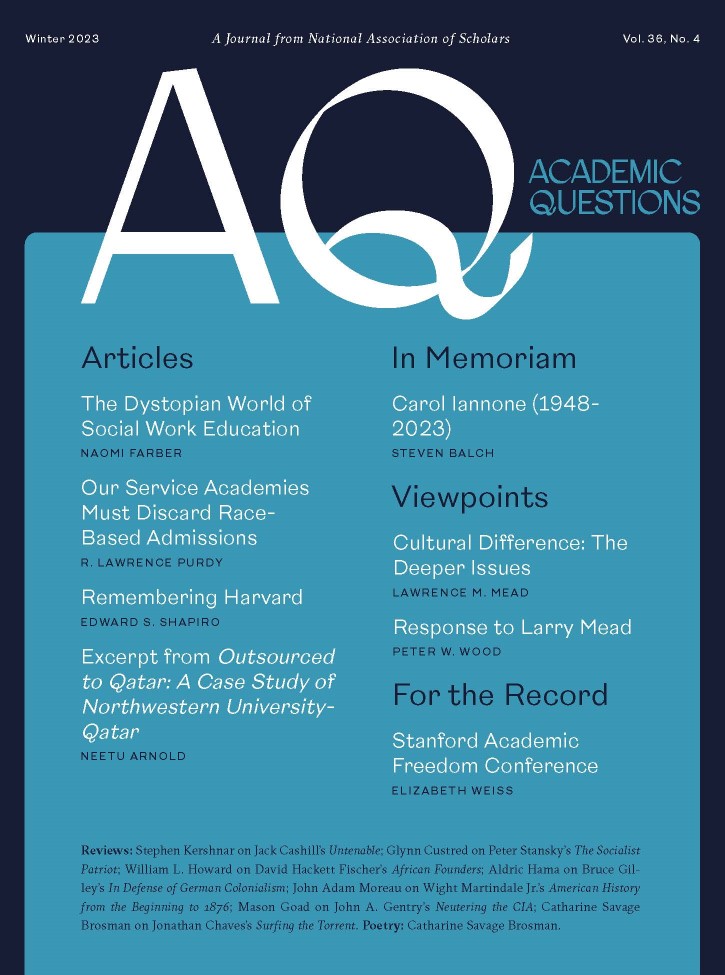Editor’s Note: The NAS published a report in September 2022 indicating that the small but wealthy Middle East “petrostate” of Qatar has emerged as the top foreign funder of American universities, donating at least $4.7 billion between 2001 and 2021. The report, led by researcher Neetu Arnold and excerpted below, is a case study of Northwestern University-Qatar and reveals how Qatar uses partnerships with American universities to advance its own interests.
Observations
NU-Q [Northwestern University—Qatar] provides an important case study in the unique way that Qatar-funded branch campuses operate. These types of partnerships are relatively new forms of foreign funding for American universities, but they have grown in popularity. NU-Q illustrates how foreign relationships can develop: the Qatari government went from paying for the operation of a branch campus to funding American fellowships, research, and even hospitals. By cultivating its relationship with the host country, the university gains the potential to rake in cash through initiatives that extend well beyond the walls of the original branch campus. . . .
The Qatar Foundation (QF), a state-led non-profit founded in 1995 by Qatar’s ruling family to improve Qatari society, funded this educational complex. Through the QF, the country hopes to 1) increase the workforce participation rate among Qataris; 2) equip Qataris to replace the foreigners who dominate many sectors of their current workforce; 3) prevent the “brain drain” that results when Qataris study abroad and fail to return home; and 4) maintain the strength of Qatar’s Islamic religious customs and traditions.1
After founding QF, Qatar began to recruit Western universities to build branch campuses in Education City, Doha, so that the nation could provide its youth with educational opportunities. The first branch campus, established by Virginia Commonwealth University, opened in 1997. NU-Q opened in 2008, largely due to the work of Carnegie Foundation of New York president Vartan Gregorian, who was both a member of QF’s board of trustees and a close friend of one of Northwestern’s trustees.2
QF recruited Northwestern to establish a Qatari branch campus in the hopes that the university would train future journalists who could build Qatar’s media presence abroad. At first, this purpose was largely unstated. In 2013, however, NU-Q entered a formal agreement with the Qatari-owned news outlet Al Jazeera designed to train journalists for the outlet. NU-Q and Al Jazeera signed a Memorandum of Understanding that created Al Jazeera scholarships for NU-Q students and established journalist exchange programs and training workshops in which the students could participate. As part of the agreement, NU-Q committed to help Al Jazeera expand into the American media market via its Al Jazeera America (AJA) news channel . . .
About Vartan Gregorian
Vartan Gregorian held many prominent leadership positions throughout his life—ranging from president of Brown University to CEO of the New York Public Library (NYPL). He was born in Iran in 1934 to Armenian parents and moved to the United States in the 1950s to pursue higher education.
Gregorian’s immigrant background shaped his approach throughout his career. Prior to his leadership roles, Gregorian worked as a professor and specialized in Middle Eastern and European affairs. As the CEO of the NYPL during the 1980s, he increased circulation of multicultural materials. When Gregorian served as Brown’s 16th president from 1989 to 1997, he worked to increase the university’s international reputation and expand its influence abroad. And during his presidency for the Carnegie Corporation of New York from 1997 until his death in 2021, Gregorian expressed interest in projects that celebrated Islamic culture and society. In 2003, Gregorian published Islam: A Mosaic, Not A Monolith, which rebutted Samuel Huntington’s “clash of civilizations” thesis.3
Gregorian’s interest to change Western perceptions of Islam and his expansive influence in the academic world made him an ideal candidate for QF’s board of trustees.
Qatar is unique compared to other Gulf States, and partnerships with Qatar pose a unique threat to American higher education. Unlike Saudi Arabia, Qatar exercises extensive bureaucratic oversight into university operations. The Qatari government also owns all the national partner organizations, including the Doha Film Institute, the Qatar National Research Fund, and Al Jazeera. Northwestern’s branch campus increases Qatar’s influence abroad—and Qatar uses its influence to aid its own friends, which include Western adversaries such as Iran, the Muslim Brotherhood, and Hamas. American universities have invested substantial time and manpower to aid the development of an illiberal regime that funds and befriends entities hostile to American national interests.
Branch campuses and other partnerships give American universities a stake in Qatar’s future, regardless of whether Qatar promotes or opposes American interests. Northwestern particularly seems eager to remain in Qatar whatever the costs. The university benefits from increased funding and the opportunity to expand and—subject to Qatari censorship to preserve traditional mores—it can spread the modern brand of illiberal progressivism and identity politics that American academics think constitutes democracy.
American universities profit from Middle East branch campuses, and so do Middle Eastern countries such as Qatar. Northwestern requires nothing of Qatar beyond its money: the nation can preserve its illiberal quasi-absolute monarchy and traditional Islamic mores and still escape criticism. American universities meanwhile gain access to a new “mission field” in which they can work to export American identity politics and the new progressive illiberalism. But this cozy arrangement only further corrupts American universities and serves neither American interests nor ideals.
1 Qatar National Vision 2030, General Secretariat for Development Planning, Government of Qatar, July 2008, https://www.gco.gov.qa/en/about-qatar/national-vision2030/; “QF Stemming the Brain Drain,” The Peninsula, September 11, 2021, https://thepeninsulaqatar.com/article/11/09/2021/QF-stemming-the-brain-drain.
2 Nancy Deneen, “Crown Gift Boosts Middle East Studies,” Weinberg College of Arts & Sciences, Northwestern University, Spring/Summer 2010, https://weinberg.northwestern.edu/after-graduation/weinberg-magazine/crosscurrents-archive/2010-spring-summer/crown-gift-middle-east-studies.html.
3 Burton Bollag, “Vartan Gregorian: From Immigrant to Leading Philanthropist,” Al-Fanar Media, May 2, 2021, https://www.al-fanarmedia.org/2021/05/vartan-gregorian/; “Vartan Gregorian: 1934–2021,” Carnegie Corporation of New York, April 16, 2021, https://www.carnegie.org/news/articles/obituary-president-vartan-gregorian/; “Vartan Gregorian: 1989-1997,” Office of the President, Brown University, accessed April 8, 2022, https://www.brown.edu/about/administration/president/people/past-presidents/vartan-gregorian-1989-1997.
Photo by Florian Wehde on Unsplash













